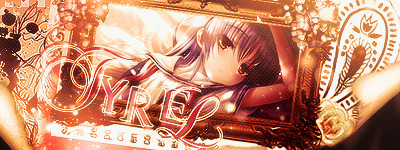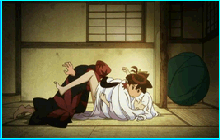This was an exceptionally good, impressively executed episode, due largely to the examination of Rikka's past and the extensive development of her character. This episode essentially signifies a partial transition within the narrative, as the story appropriately shifts it's focus onto the emotional elements of Rikka's delusional tendencies. The episode very deftly and effectively handled the balance between it's dramatic interludes and the occasional comedy that was filtered throughout, without faltering into an unnecessarily heavy reliance on either aspect. Of course, the rather serious tone was quite prevalent, due to it's presence within the majority of the episode's developments, but I felt that the emotions were conveyed considerably well.
My favorite sequence, by far, was Tooka's beautifully melancholic conversation with Yuuta, as she details the mysterious aspects of Rikka's past, revealing the tragedy that triggered the sudden adornment of her constructed, chuunibyou facade, while ultimately suggesting that this was used as an escape from the unexpected sorrows within a reality she couldn't accept. This sequence was elevated further by the wistful music that accompanied it and the terrific storyboarding throughout, such as the transition between Rikka's hand reaching towards a star and the subsequent fading into the small fire Yuuta was hovering over. I love that the reasoning behind Rikka's chuunibyou delusions wasn't of mere simplicity, since this nuanced development effectively allows for a thorough deconstruction of her character, and, ultimately, makes for a much more satisfying story.
One of the best moments was Yuuta's conversation with Rikka after he first found her in her room, since, in this brief, but revealing scene, Rikka's words subtly elaborate on her hidden emotions, drawing upon several disparate aspects of her characterization. There's this really effective dichotomy that was portrayed between the state of Rikka's two bedrooms. The one she usually resides in is lusciously colorful with it's wildly imaginative decoration, adorned with a certain extravagance found in the plethora of seemingly insignificant, but highly expressive objects, while the other is comparatively sparse, as a particularly ordinary, but lifeless atmosphere permeates the room. This wonderfully illustrates a rather meaningful contrast between the significance of her emotional connection to each place.
The insight into Rikka's past, though somewhat predictable, was thoroughly emotional and surprisingly complex, given the typically lighthearted nature of the show. Rikka and Yuuta's compelling interactions continue to be the best aspect of each episode. As such, the moment Yuuta, unlike all the rest, tells her that he'll assist in searching for the Ethereal Horizon was a considerably significant development in their relationship. I also love that their hand-holding scene from the last episode was directly referenced.
Shinka and Sanae continue to complement each other extremely well. Their interactions never fail to provide some of the best comedy in each episode, and, as such, I greatly enjoyed all of their scenes in this one. I also thought their mutual sunburn was a nice touch. Shinka's ability to notice the potential for love between Yuuta and Rikka was quite unexpected, but great, since, thankfully, it completely eases some of my lingering concerns that she would eventually develop feelings for Yuuta. Although, so far, they've mostly been relegated to the strictly comedic side of each episode, Kumin and Makoto's slowly developing relationship is great, since it provides a natural reasoning for their seemingly secondary characters to be further explored and developed.
The emotionally brutal final sequence was amazingly directed. The momentary flash of Rikka's loving parents standing around her at their house, followed by Rikka happily edging closer to this fleeting illusion was contrasted extremely well by the following shot, in which her joyful memory suddenly collapsed into the form of an unsettling desolation, marked by the minuscule sign that stood in it's stead. Of course, one of the most important elements that allowed this scene to work as superbly as it did was the appropriate absence of words, as a sort of silent serenity crept into this startling revelation. Really, this, along with the train sequence from the previous episode, are two of the best scenes in the entire show, as they were handled with such impeccable care and a suitably low-key approach to storytelling that's remarkably rare.
The visuals were, as always, fantastic, particularly in the highly detailed and aesthetically appealing backgrounds. This episode was also suffused with rather powerful imagery, such as the expansive shot from behind Rikka's isolated figure against the backdrop of a distant light peeking through the darkness, as her forlorn gaze reaches towards the horizon. The subdued lighting during Rikka's bedroom conversation with Yuuta excellently created this detached, melancholic atmosphere that worked quite well. Musically, this episode was really good and highly atmospheric, especially the selection that was used during Tooka's grave-side conversation with Yuuta, as the delicately mournful combination of a soft piano and violin poignantly illuminated the various emotional complexities within that moment. The animation was exceptional throughout, as it was able to skilfully capture and accentuate subtle movements, such as the moment Yuuta casually lowers his hand on the train, accidentally brushing his fingers against Rikka's, then carefully pulls them away.
All in all, Chuunibyou satisfied immensely with one of it's best episodes, while it also manages to consistently excel with it's intermittent touches of romance, engaging character interactions, excellent humor, and an increasingly intriguing story. I'm really looking forward to the next episode, since the developments within this episode and the next should propel Rikka and Yuuta's relationship past the quite affectionate connection they currently have into an exceedingly romantic one. Also, due to the increasingly dramatic nature of the narrative, I remain quite hopeful that the story will, in fact, conclude with a realistic manner of developing Rikka's character, in which she willingly accepts the necessity of transitioning into a fully realized maturity. |














